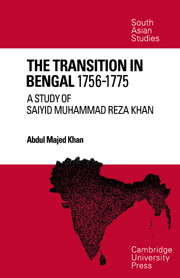Book contents
- Frontmatter
- Contents
- Map of the Mughal Subah of Bengal, Bihar and Orissa in the eighteenth century
- Preface
- List of Company servants with their Mughal titles
- List of abbreviations
- 1 Introduction: the twilight of Mughal Bengal
- 2 The early life of Reza Khan and his first public office in 1756
- 3 The involvement in politics, 1760–1763
- 4 The Naibat at Dacca, 1763–1765
- 5 The Naibat Subahdari at Murshidabad, 1765
- 6 Reza Khan at the zenith of his power, 1765–1767
- 7 The early reverses, 1767–1768
- 8 Conflict of interests: opposition to trade monopolies and proposal for supervisorships, 1769
- 9 The conflict deepens, 1769–1770
- 10 The rearguard action and Reza Khan's arrest, 1770–1772
- 11 The ‘Inquisition’, 1772–1775
- Select bibliography
- Index
- Plate section
3 - The involvement in politics, 1760–1763
Published online by Cambridge University Press: 29 October 2009
- Frontmatter
- Contents
- Map of the Mughal Subah of Bengal, Bihar and Orissa in the eighteenth century
- Preface
- List of Company servants with their Mughal titles
- List of abbreviations
- 1 Introduction: the twilight of Mughal Bengal
- 2 The early life of Reza Khan and his first public office in 1756
- 3 The involvement in politics, 1760–1763
- 4 The Naibat at Dacca, 1763–1765
- 5 The Naibat Subahdari at Murshidabad, 1765
- 6 Reza Khan at the zenith of his power, 1765–1767
- 7 The early reverses, 1767–1768
- 8 Conflict of interests: opposition to trade monopolies and proposal for supervisorships, 1769
- 9 The conflict deepens, 1769–1770
- 10 The rearguard action and Reza Khan's arrest, 1770–1772
- 11 The ‘Inquisition’, 1772–1775
- Select bibliography
- Index
- Plate section
Summary
Reza Khan's appointment as Faujdar of Islamabad committed him to politics: only success in politics could ensure his survival. Yet the appointment was an ambiguous one. Reza Khan himself described it as a favour done by Mir Jafar on account of his relationship with the Nawab Alivardi Khan. But the invasion of the Emperor Shah Alam and the concurrent swing in public opinion in favour of the ousted family were to lead the Nawab and Miran to eliminate many Alivardians on suspicion of disloyalty. Between January and June 1760 three favourites of the former regime, Shah Abdul Wahab Khan, Yar Muhammad Khan and Agha Sadiq, son of Agha Baqar, a Dacca zemindar, were all executed. As the alarm of Miran and his father grew, the imprisoned aunt and mother of Siraj-ud-daulah were also killed near Dacca. Ghulam Hussain says that Miran had another 300 suspects on his list for physical elimination after his return from Bihar. Why then was Reza Khan appointed?
One answer may be that Reza Khan's known enmity towards Mir Qasim had made him more acceptable, for Mir Qasim was already a suspect by the beginning of 1760, though not yet an open rival of Miran. While Miran was striving to make himself independent of the English, recruiting European deserters, creating a large body of Rohilla-Afghans, sending missions to the Deccan to recruit there and make contact with the French, Mir Qasim was cultivating Hastings's friendship.
- Type
- Chapter
- Information
- The Transition in Bengal, 1756–75A Study of Saiyid Muhammad Reza Khan, pp. 32 - 48Publisher: Cambridge University PressPrint publication year: 1969



